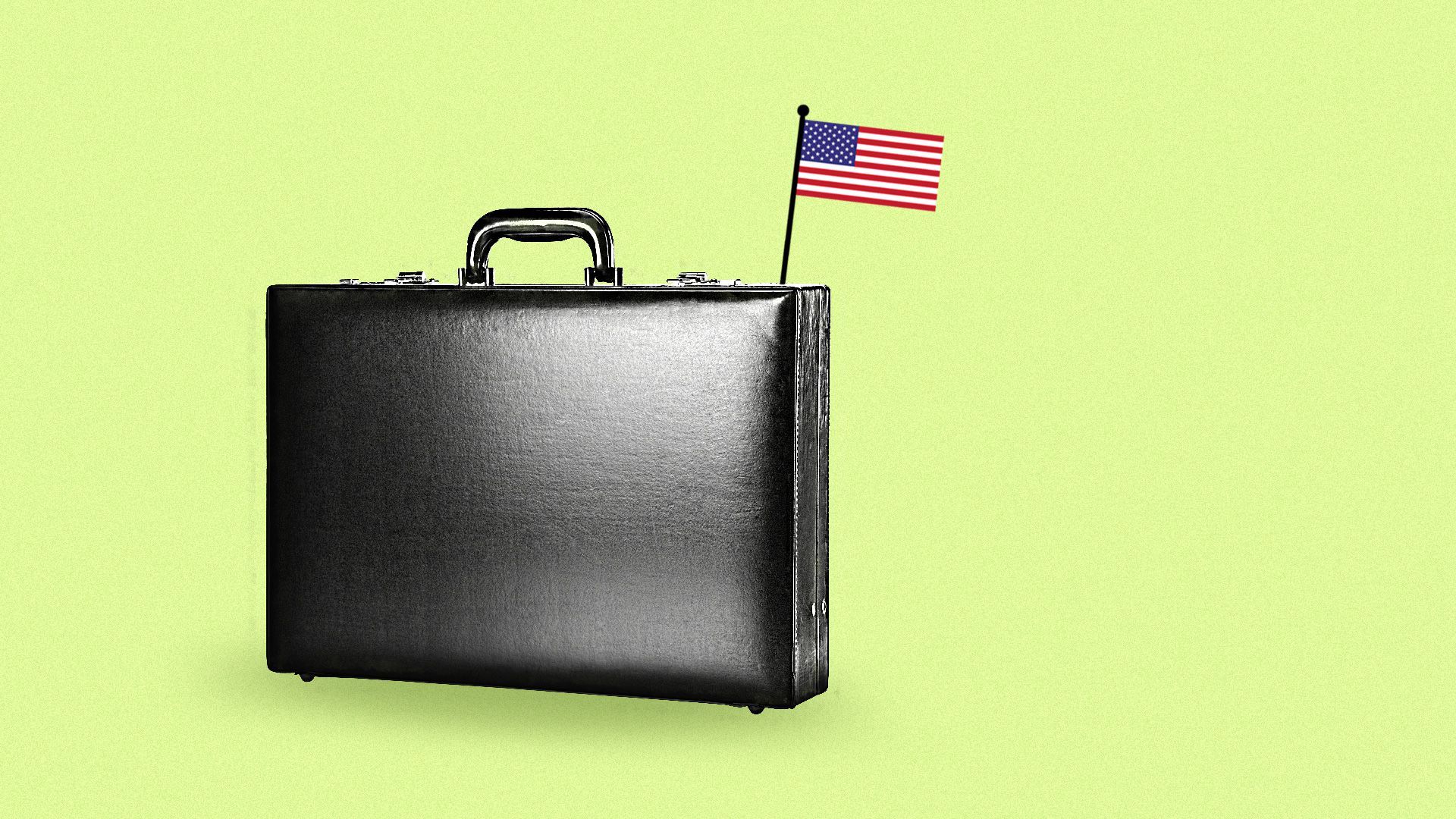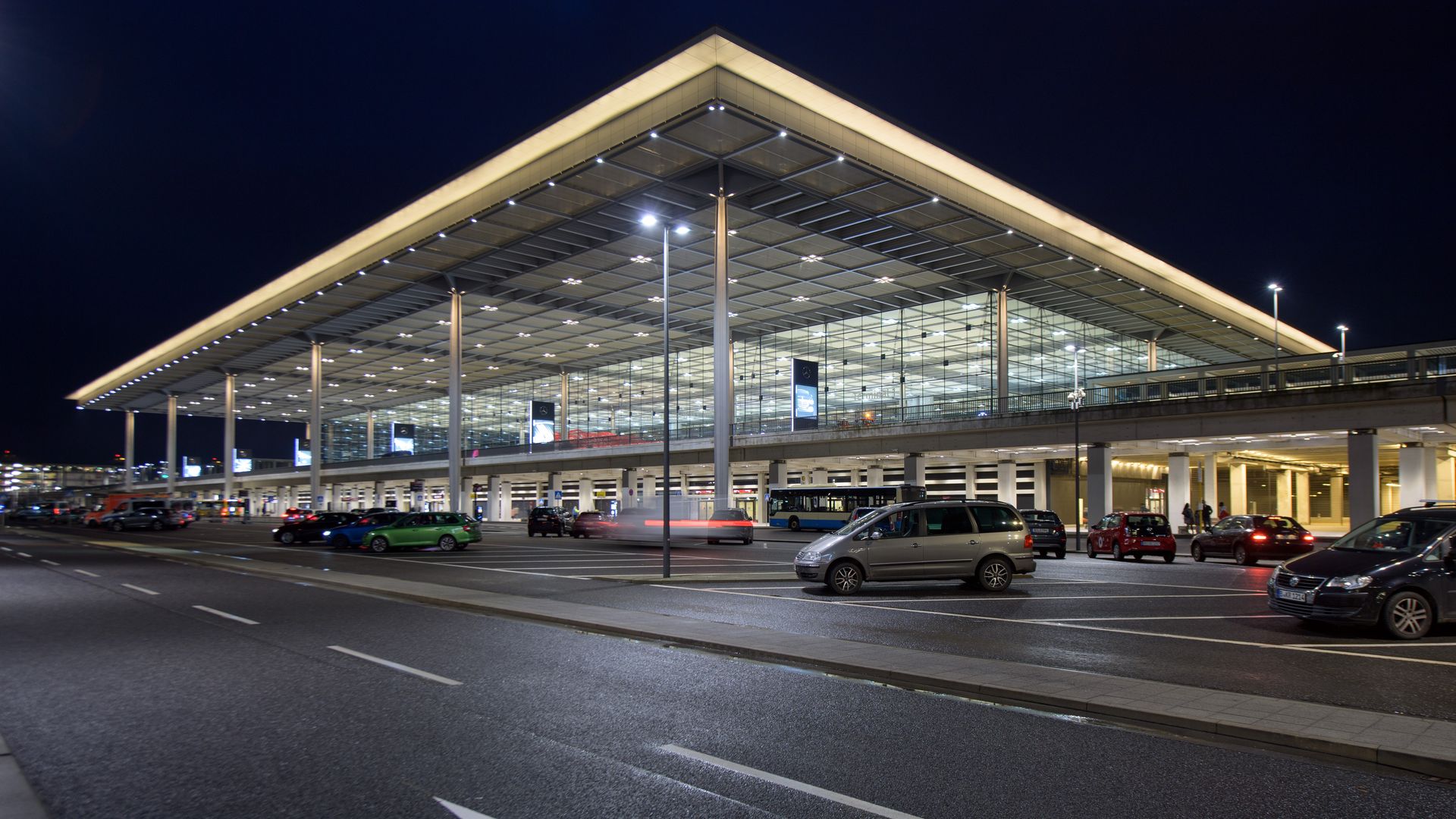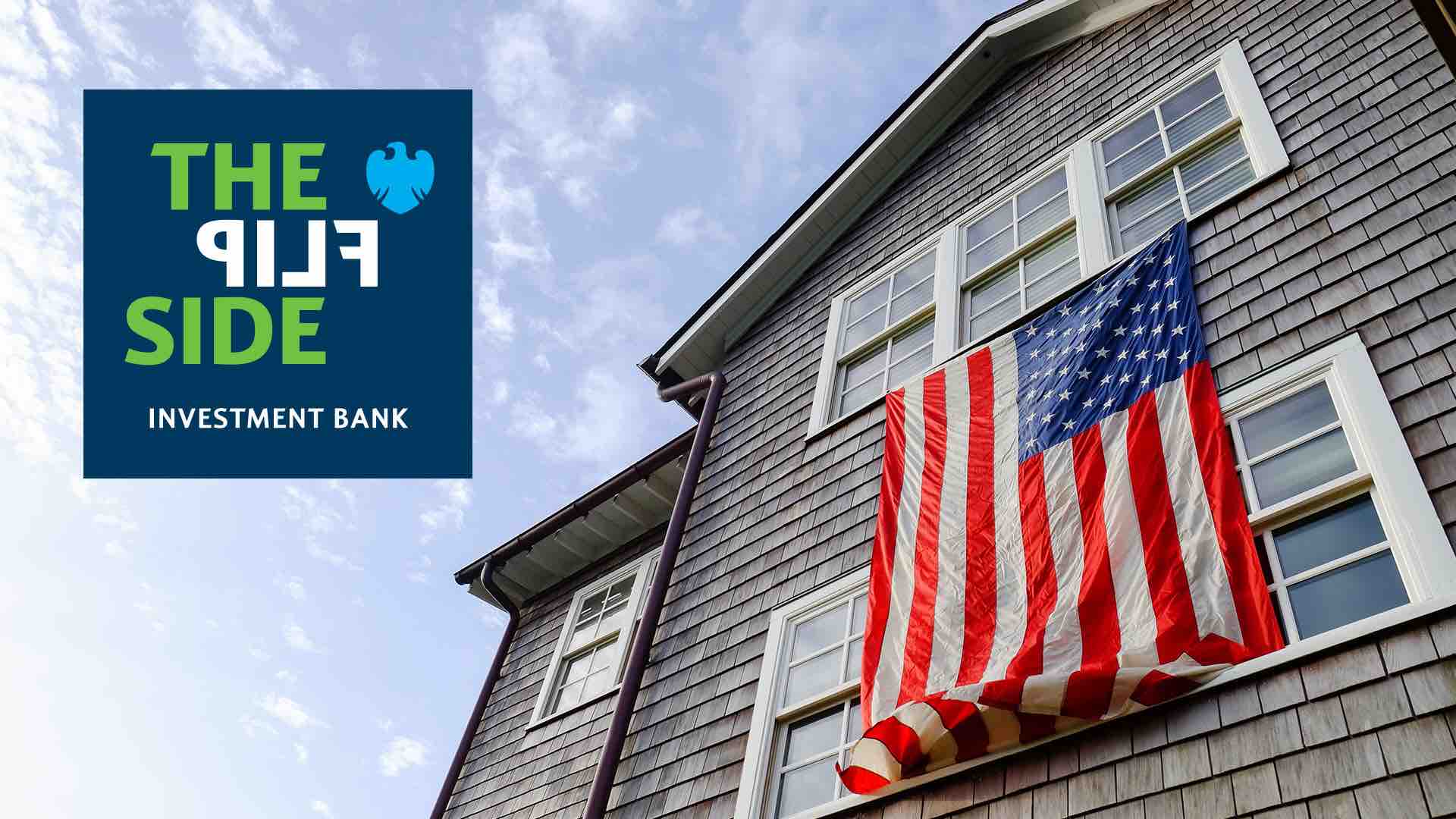| | | | | | | Presented By Barclays Investment Bank | | | | Axios Capital | | By Felix Salmon ·Nov 05, 2020 | | Situational awareness: ByteDance, the owner of TikTok, is looking to raise $2 billion at a valuation of $180 billion, per Reuters. President Trump took straight aim at the company ... and seems to have missed entirely. - Congratulations on making it to Thursday. I know, it's been a very long week. So this week's Axios Capital is just 1,612 words long — a 6-minute read.
- I'll explain just how bad the election result is for the economy (even though stonks are up); I also have items on the Ant Group IPO, the tension between financial innovation and regulation, the decline of corporate taxes, and more.
| | | | | | 1 big thing: It's the worst-case economic scenario |  | | | Illustration: Sarah Grillo/Axios | | | | Economically, the outcome of the election could not be worse than where we seem to be headed: A Biden presidency with a Republican Senate. Why it matters: "Gridlock" — where the president's party doesn't control both houses of Congress — is being cheered by financial markets wary of political overreach. - Stocks are not the economy, however. In the depths of a global pandemic, fiscal boldness is exactly what's needed for the economy as a whole. The problem is that political obstructionism is all but certain.
The big picture: Republicans are always fiscal conservatives when there's a Democrat in the White House, while Senate Majority Leader Mitch McConnell has been described by The Atlantic's Joshua Green as a "strict obstructionist." - On his list of things to obstruct, per Axios' Mike Allen: The appointment of big-spending left-wingers to a potential Biden Cabinet.
Where it stands: McConnell will control the Senate unless Democrats win both open seats in Georgia — an outcome that seems highly unlikely, given the results of the first round of voting on Tuesday. So long as McConnell keeps his position, he will prevent any major Biden-sponsored spending bill from even reaching a vote. - Maybe Trump can help. He has some ability to push new spending bills through Congress, and in any scenario he's still president through Jan. 20.
- The problem, as Trump's former Council of Economic Advisers chief economist Casey Mulligan told the Washington Post, is that Trump "doesn't like to give anything for free," and has little interest in stimulus just for the sake of stimulus.
How it works: The first wave of coronavirus in the U.S. was met with massive fiscal stimulus; the current wave won't be. Layoffs at state and local governments are just beginning, and many service industries will convert furloughs to layoffs if the pandemic continues to rage. That's enough to create a so-called "double-dip" recession. - "A second dip is very likely in the absence of some major stimulus from Washington," Center for Economic Policy Research chief economist Dean Baker tells Axios.
- Adds Stony Brook economist Stephanie Kelton: "Without another substantial fiscal package, I believe the leg will definitely get kicked out from under the K-shaped recovery. The upper leg will come tumbling down, potentially with significant distress selling as a wave of defaults and bankruptcies takes hold."
By the numbers: Expect 5.3 million workers to lose their jobs by the end of 2021 if state and local governments don't get a bailout, per the Economic Policy Institute. - Those jobs are in dense urban centers — the engine of the national economy. If that engines start to sputter, the whole country is likely to fall into a recession.
- McConnell and the Republicans are convinced that state and local governments are simply using the coronavirus as an excuse to get bailed out of their overspending ways. There's no way McConnell will finance a local-government rescue via a Biden-backed spending bill.
The bottom line: States like Maine, Texas, Kentucky, Michigan, Georgia, and North Carolina saw large numbers of ticket-splitters: Voters who voted Democratic for president but Republican for Senate. They might not like what they voted for, but they may get it anyway. |     | | | | | | 2. When an Ant is too big to fail |  | | | Illustration: Sarah Grillo/Axios | | | | Here's one good reason why Ant Group's IPO was pulled on Tuesday: It is one of the most systemically important financial institutions in the world, and at the moment it's barely regulated. The big picture: Ant provides the technology that powers much of the Chinese economy, from borrowing to saving to investments to insurance. - Its privately-owned payments system is relied upon by hundreds of millions of people daily.
- Ant also underwrites hundreds of billions of dollars in consumer loans. Even though it takes little if any credit risk on those loans, which it originates on behalf of other banks, it has built up an effective monopoly in pricing unsecured consumer debt.
Why it matters: Ant Group was set to go public with a $313 billion valuation, befitting a company with its awesome market power. But regulators have now stepped in, trying to encourage competition and ensure that the "techfin" giant is under control. - The IPO is off, for the time being. One irony is that the $35 billion that Ant expected to raise — the largest IPO of all time — would have gone a long way towards assuaging regulators' fears that the company is insufficiently capitalized.
- The silver lining: Suspending the IPO gives Ant space to reconfigure itself in line with regulators' requirements. Trying to do that as a $350 billion public company would have been much harder.
What they're saying: Chinese Vice Finance Minister Zou Jiayi told a recent conference that fintech must not be allowed to dodge regulation, per Reuters. She pointedly added that winner-take-all monopolies are also bad. - Chinese bank regulator Guo Wuping similarly wrote on Monday that Alibaba's credit card and loan products are no different from those issued by banks, per the NYT. They therefore should be regulated the same way, he said.
The bottom line: Ant effectively controls far too much of China's financial system to not be closely regulated. |     | | | | | | 3. Financial innovators duck regulators |  | | | Illustration: Sarah Grillo/Axios | | | | Ant is not alone. In the U.S., unregulated unicorns — think Chime, worth $14.5 billion, or Plaid, worth $5.3 billion if its acquisition by Visa is allowed to go through — are transforming the world of financial services. - Other startups, like the $10 billion Affirm, have been effectively unregulated ever since the Trump administration rendered the Consumer Financial Protection Bureau toothless.
- The largest private fintech is Stripe, worth $36 billion. While it does have many regulators touching parts of its business, it doesn't have a banking license, which is what brings the real scrutiny.
Why it matters: Fast-growing startups generally try very hard to avoid regulation. As they become increasingly important, they collectively represent a growing blind spot for regulators. How it works: Chime used to be called Chime Bank. Its main product is mobile banking, and its features include overdraft protection, credit cards, and the ability to send paper checks. But it is not a bank. - In principle, regulators have visibility into Chime via its partner banks, who in turn become regulators-by-proxy. But at some point, Chime will be too big and too important to be regulated at one remove.
Be smart: U.S. fintechs tend to avoid blatantly antagonizing regulators in the way that Ant Group's billionaire controlling shareholder did recently. - Jack Ma railed against financial regulators, said that financial regulation was outdated, and claimed technology companies should not be subject to regulation.
- Between the lines: The IPO would probably have happened on time had it not been for Ma's speech.
Robinhood came close, however, when it tried to do an end-run around banking regulations by offering an uninsured checking account. Between the lines: U.S. regulators would never simply announce a crackdown on a formerly-unregulated financial giant 36 hours before its IPO. But they all understand that heavily-regulated banks are operating at a competitive disadvantage to startups. The bottom line: Regulators haven't been able to keep up with the pace of financial innovation in America; too many companies now find it too easy to slip between categories and evade effective regulation. - In 2007, before he was distracted by the financial crisis, then Fed chair Ben Bernanke proposed instead a risk-based system that would regulate financial companies not according to what they did but rather according to the risk they pose. It's probably time for that idea to be revisited.
|     | | | | | | A message from Barclays Investment Bank | | Addressing a growing homeownership divide | | |  | | | | Barclays Research found rising income inequality in the U.S. is strongly associated with lower homeownership rates, especially in states with higher Black populations. What role should the government play in the mortgage market? Explore the report. | | | | | | 4. The friendliest corporate tax regime ever |  Data: Bureau of Economic Analysis via FRED; Chart: Axios Visuals Corporate taxes are lower, as a percentage of GDP, then they've ever been. And they're likely to stay there, if McConnell refuses to bring any tax-hike bills to the floor of the Senate. By the numbers: Before 2018, corporate income taxes had fallen below 1% of GDP only once, for three quarters at the nadir of the Great Recession in 2008-09. - Nowadays, that's normal: They've been less than 1% of GDP in five of the past 10 quarters.
Between the lines: A recent paper by Steve Rosenthal and Theo Burke at the Urban-Brookings Tax Policy Center makes the point that corporate taxes are one of the few ways that the U.S. government can effectively levy taxes on foreigners. - "Foreigners now hold about 40 percent of total US equity," they write — which means that they also reap much of the benefit from corporate tax cuts.
|     | | | | | | 5. Coming up: October's payrolls report |  | | | Illustration: Lazaro Gamio/Axios | | | | The October jobs report is out tomorrow at 8:30am ET, writes Axios' Courtenay Brown. - According to FactSet, the unemployment rate is expected to fall 0.2 points to 7.7%, while 580,000 jobs will be added.
Why it matters: The job gains will help chip away at the 10.7 million jobs needed to return to the pre-pandemic level. We're already up more than 11 million from the low point. - Anything below September's 661,000 would confirm a continuing slowdown in growth. The pace has decelerated every month since June, when the economy added 4.8 million jobs.
|     | | | | | | 6. Building of the week: Berlin Brandenburg Airport |  | | | Photo: Soeren Stache/picture alliance via Getty Images | | | | "No language on Earth has ever produced the expression 'as pretty as an airport,'" wrote Douglas Adams in "The Long Dark Tea-Time of the Soul." - "Airports are ugly .... They have sought wherever possible to expose the plumbing on the grounds that it is functional, and conceal the location of the departure gates, presumably on the grounds that they are not."
Berlin Brandenburg Willy Brandt Airport, or BER, is not a pretty airport; in fact, the family of former Chancellor Willy Brandt at one point asked that his name be taken off the airport, since the terminal has become such a national embarrassment. - The airport's architect, Meinhard von Gerkan, has a hatred of airport retail, and so he designed an airport with no shops at all. Of course, shops were later added as part of a decade-long series of fiascos and expansions.
- The original opening date was in June 2012; many others came and went before the $7 billion airport was finally allowed to open this month, in the middle of a pandemic.
- The technology in the airport is now so old that it is already out of date, even on the opening day.
Go deeper: To truly appreciate the depths of incompetence and corruption involved in BER takes time. I can highly recommend this multipart podcast series on the airport, from the English-language Radio Spätkauf. It's not only very funny and well produced, it will also quite possibly forever change the way you think about German engineering. |     | | | | | | A message from Barclays Investment Bank | | New episode: The Flip Side podcast on U.S. housing reform | | |  | | | | Barclays Head of Research Jeff Meli and MIT Finance Professor Deborah Lucas debate what role, if any, Fannie Mae and Freddie Mac should play in the future of the U.S. housing finance market. Hear what they had to say in the latest podcast episode. | | | | Subscribe to this email here if you don't already, and do send me a postcard from BER if you can find one, and a place to mail it from. | | | | Axios thanks our partners for supporting our newsletters.
Sponsorship has no influence on editorial content. Axios, 3100 Clarendon Blvd, Suite 1300, Arlington VA 22201 | | | You received this email because you signed up for newsletters from Axios.
Change your preferences or unsubscribe here. | | | Was this email forwarded to you?
Sign up now to get Axios in your inbox. | | | | Follow Axios on social media:    | | | | | |
No comments:
Post a Comment